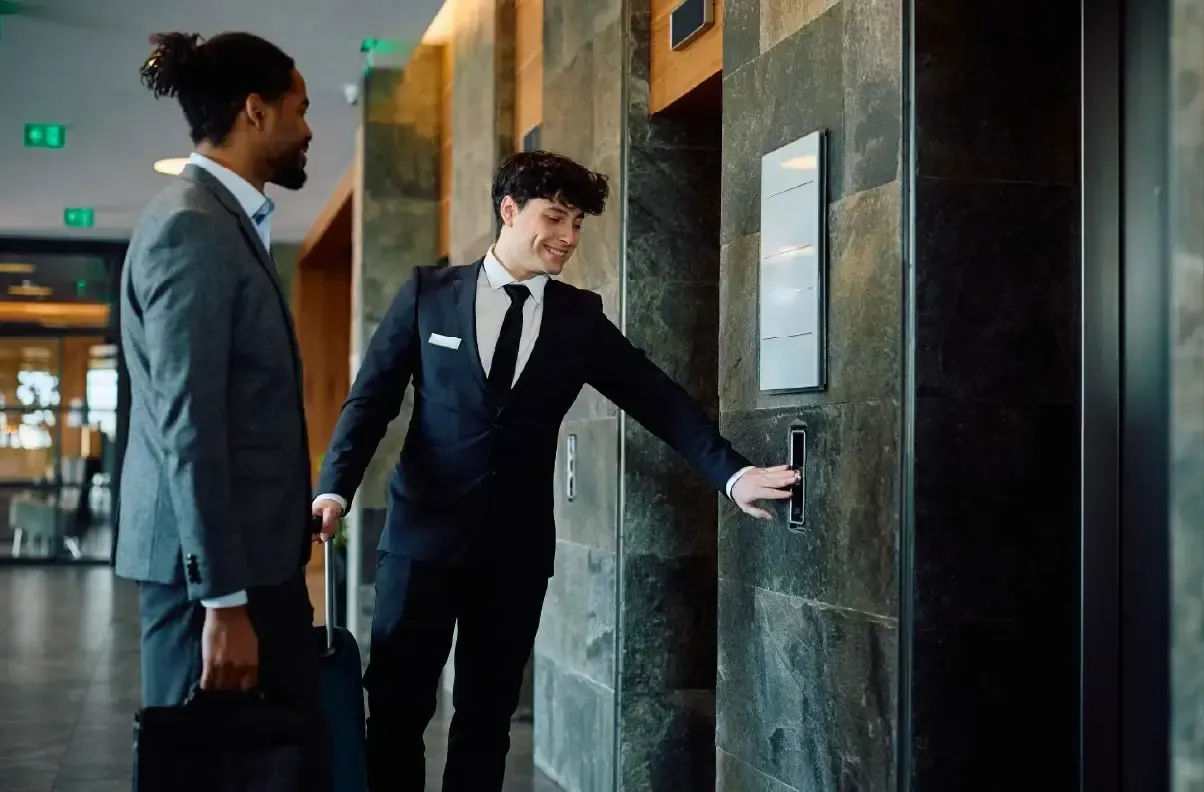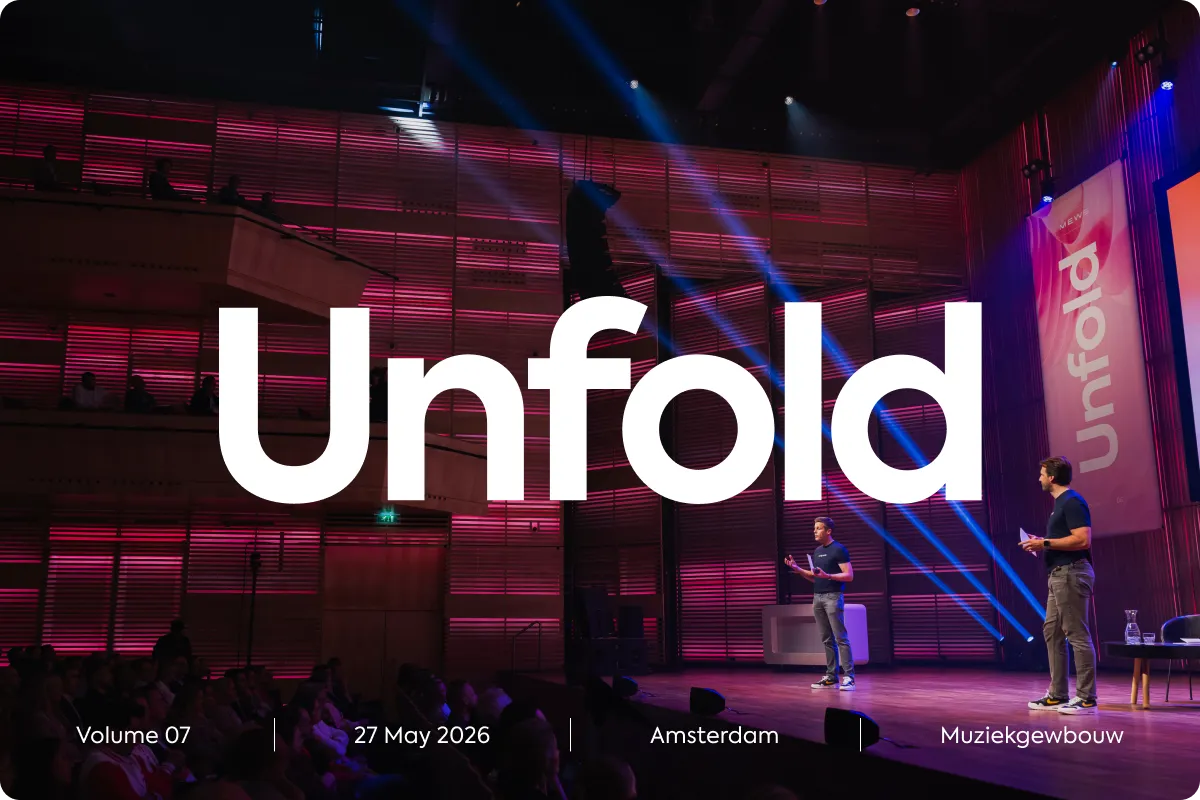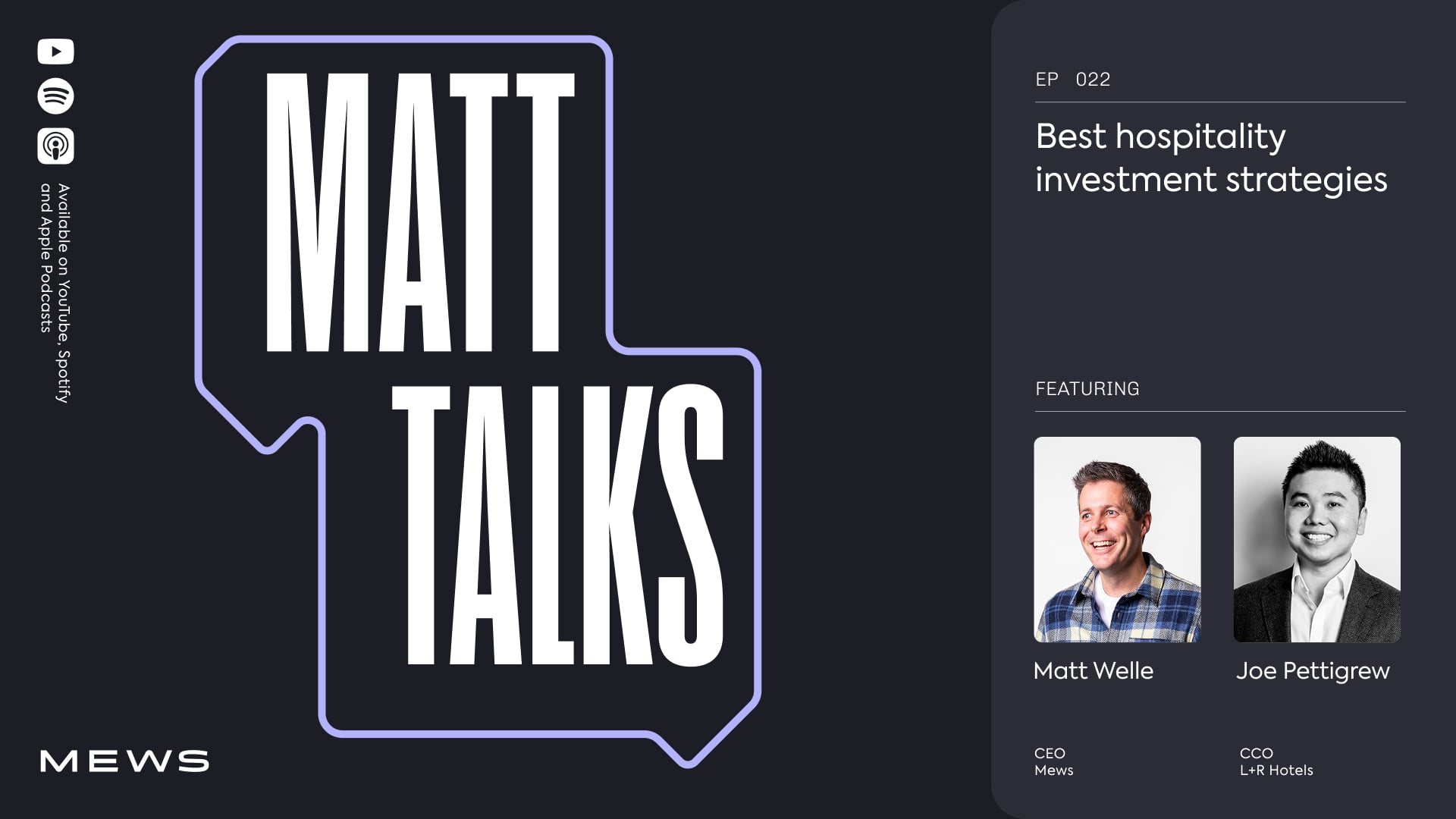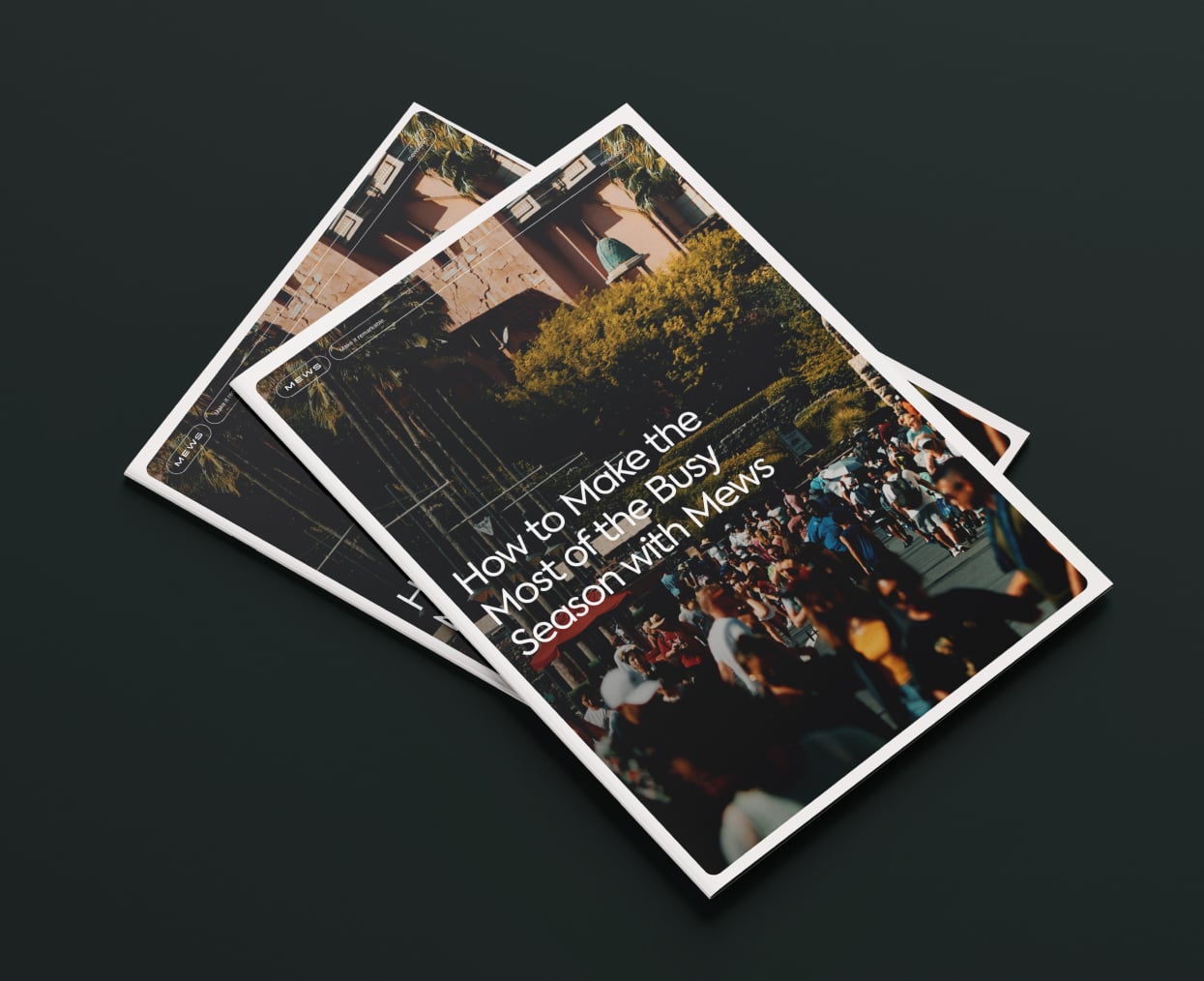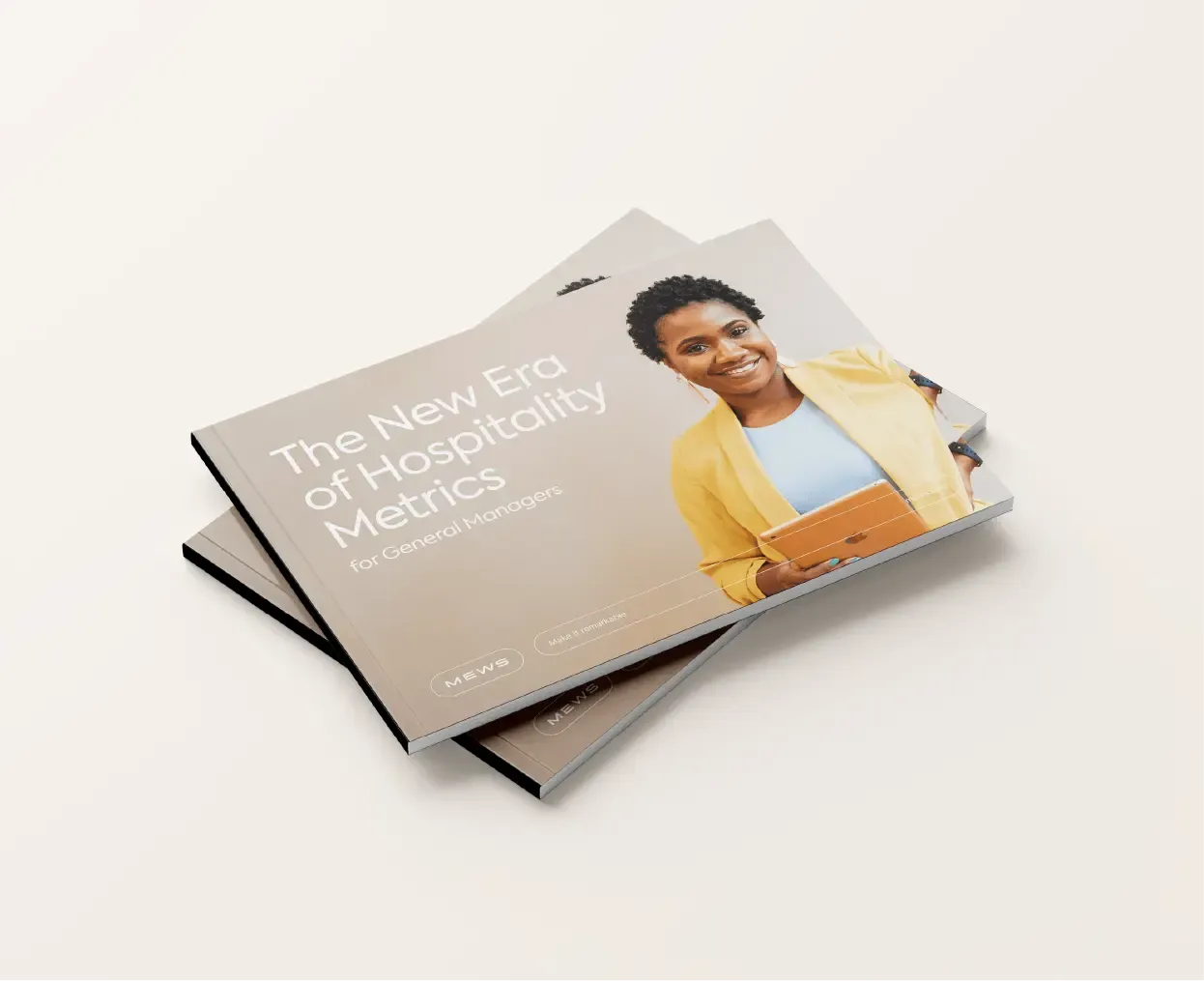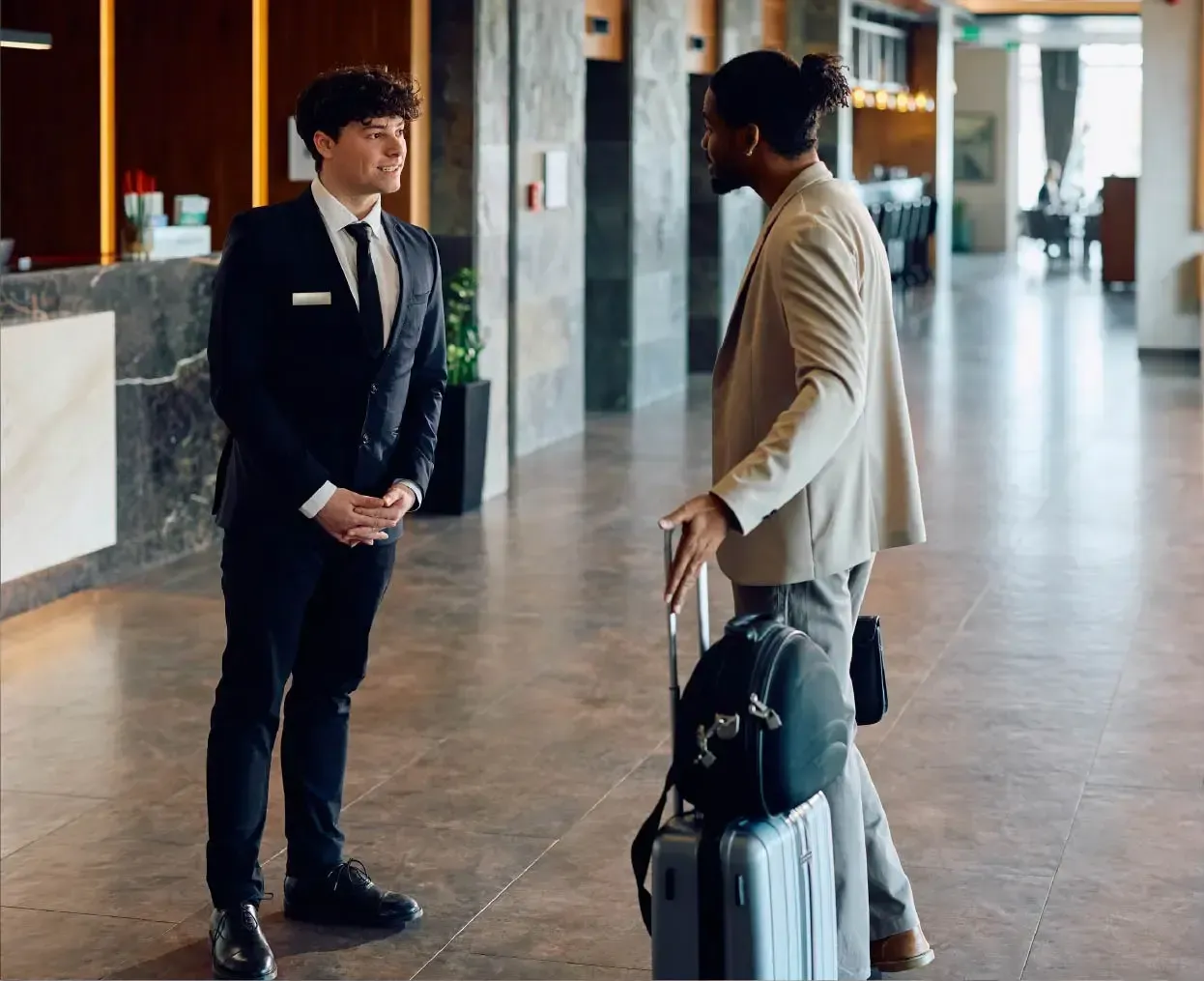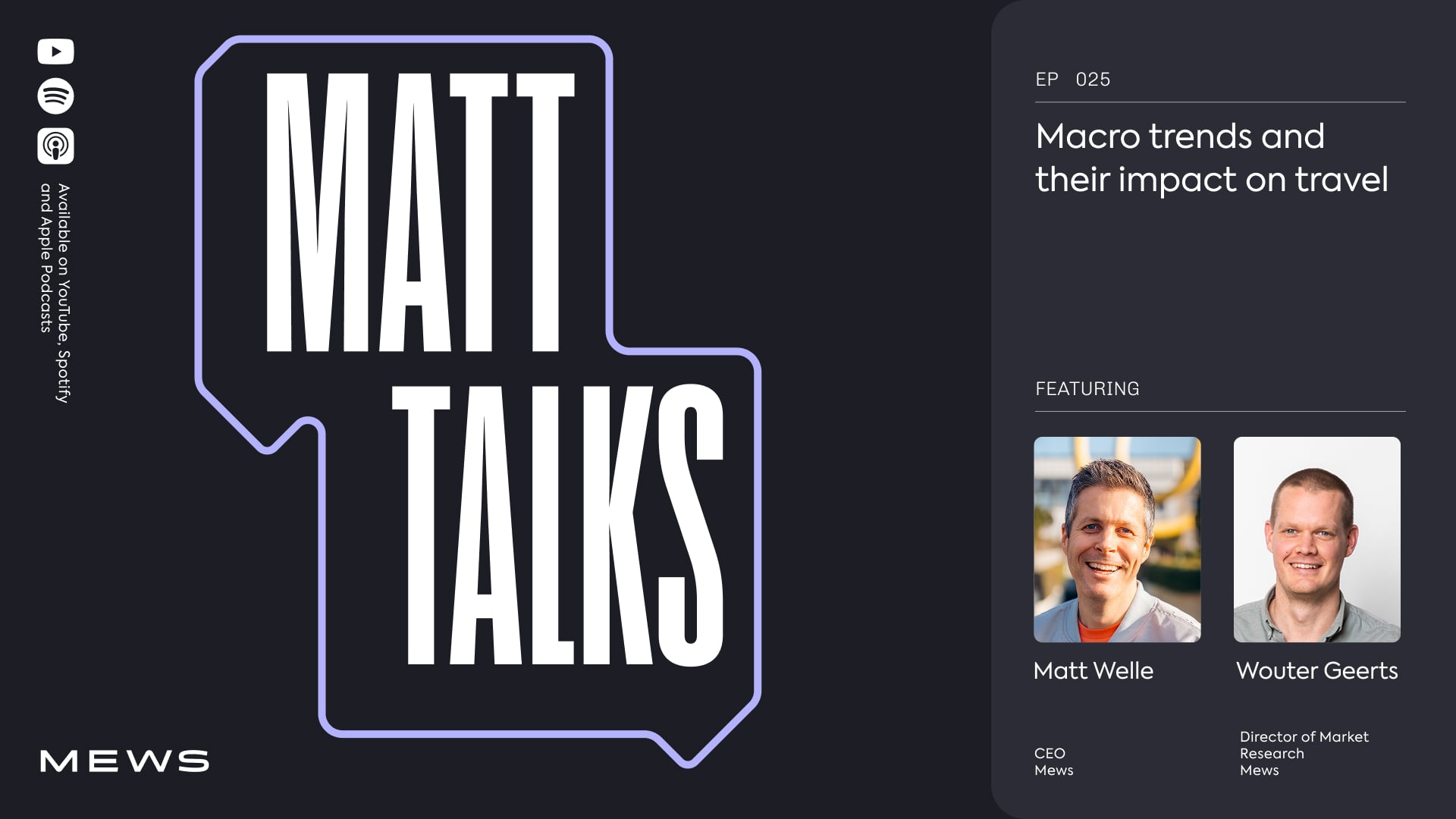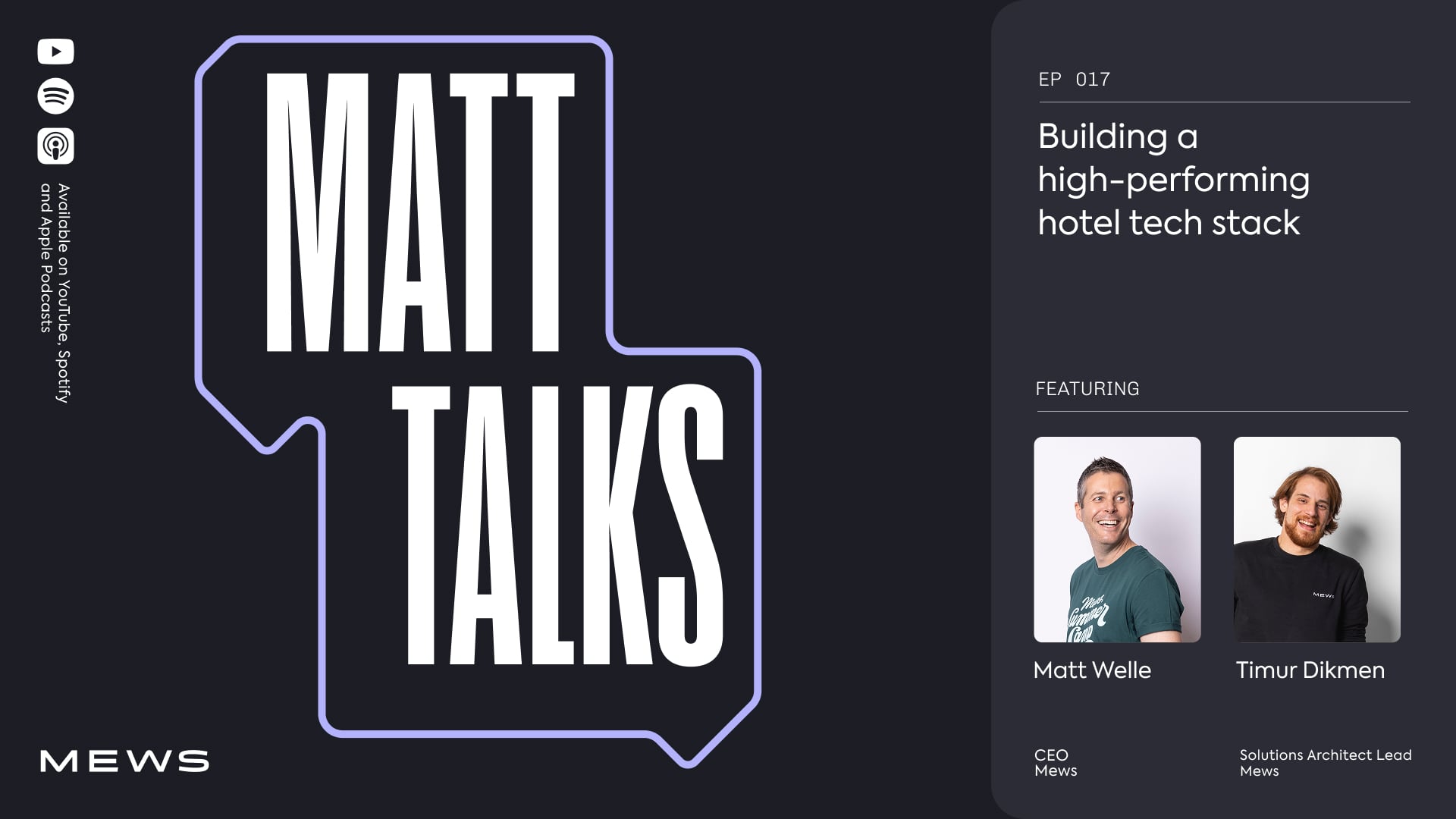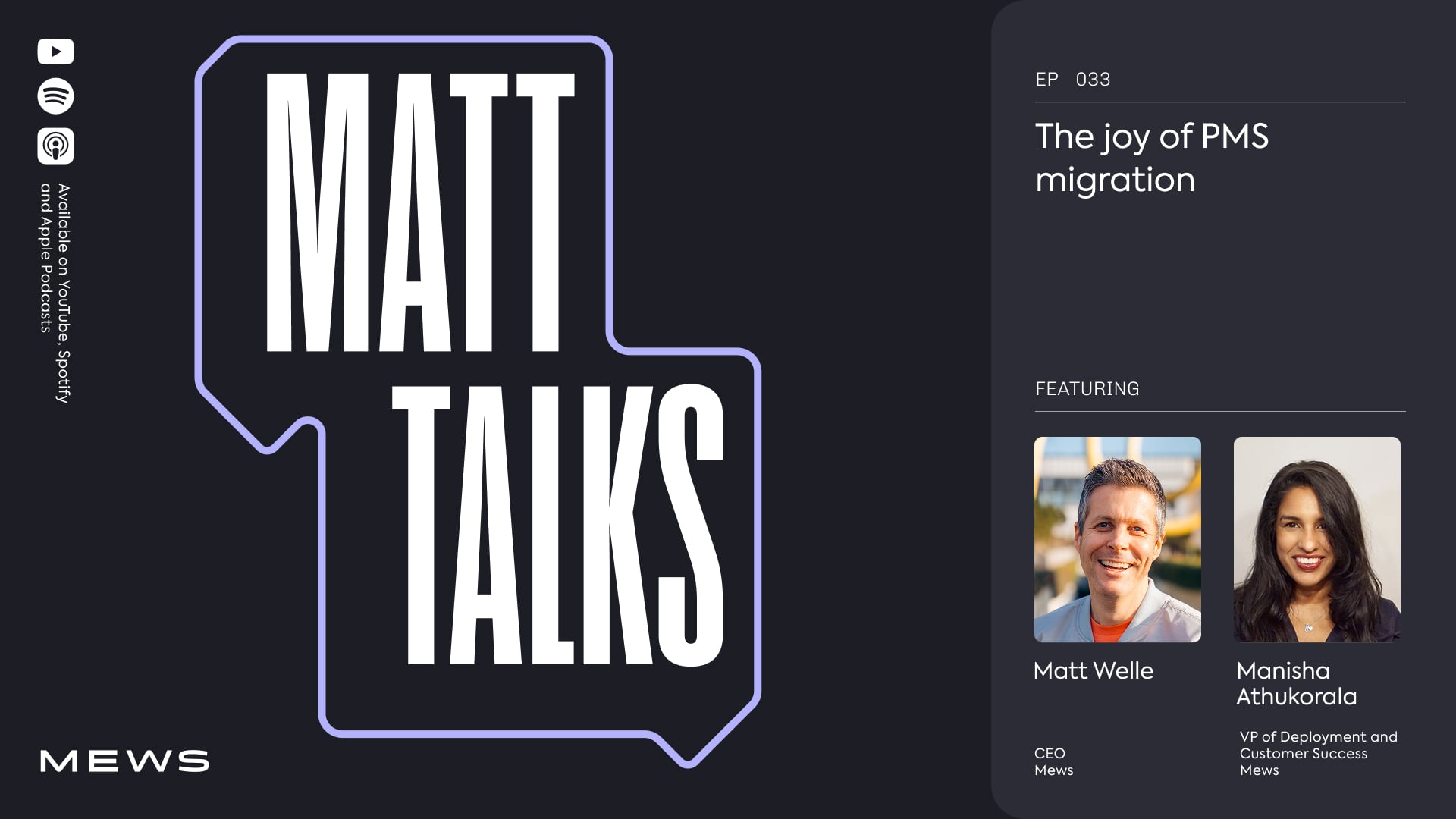What to expect?
Meet your speakers

Matthijs Welle
CEO, Mews
After years in the trenches of hospitality, Matt joined the Mews journey during its early days in 2013. Since then, he’s been our fearless CEO, leading the company and the industry forward.

Joe Pettigrew
CCO, L+R Hotels
Joe Pettigrew is a passionate commercial leader in hospitality and a proven strategist in driving the commercial success of hotels and resorts globally.
Episode chapters
Transcript
Introduction
Hi, everyone. Welcome back to Matt Talks. And this time, Matt talks to Joe. And I invited Joe because he's a speaker at our upcoming Mews Unfold conference on the thirtieth of April.
And I thought it would be great to introduce him to you and also to also invite a different perspective into the room because often I talk about the technology and I talk to people that are living in hotels. But Joe comes out of L & R hotels or properties where they own and manage a number of properties across the globe. And he has a very different perspective from like almost a helicopter view looking at hotel operations. And I thought it would be good to invite Joe into the podcast this week.
Joe, welcome.
Thank you very much for having me, Matt.
Do you wanna maybe give us a little bit of background on what made you like, who you are today in in your role? So like, what's your education? What are the jobs that you did before?
Yeah. Sure. So let me maybe start from the back and then maybe go back in time. But, so today, I, serve as a group chief commercial, officer commercial officer at L&R Hotels, which is a global private, real estate investment firm. We have about ten million pounds worth of assets currently under management, which are wholly owned, by Ian and Richard Livingston.
We have about, we have hundred and fifteen hotels globally ranging from an extended stay hotel to mid scale to iconic luxury hotels all throughout Europe.
And I'd never heard of L and R before until I went into the website and I started looking at the names like, oh, I know a bunch of these hotels and Yeah.
That I'd run into before you.
Yeah. Yeah. So so we do own and manage quite a wide range ranging of of hotels here, which is quite unique.
What's your favorite one in the collection?
If I were to pick, I would have to pick Chewton Glen, which is a which is actually one of those hotels that that consistently get picked as the best British hotel in every magazine competition, you know, every single year.
It's, it's one of the very first luxury hotels, in the countryside of the UK. It's I believe the very first luxury hotel that had indoor pool as spa as a part of the hotel experience. It is steeped in history, is served lots of, you know, iconic folks and visitors throughout its time. It's really the one that kind of kick started all the luxury country house scene.
And what's one thing that they do that excites you? Like, is there some things specifically that you love about this hotel personally?
So it probably goes a little bit counter to what you do for the industry, but they it's actually quite old school in the way that when you go and and stay there, not the product is old school. It's very modern, and and the product itself is is very nice, but they do believe in the the old school human touch, that white glove service, just making you feel very welcome. Everyone, like, you you go there and stay there even as a, guest staying at our standard room. You you feel like you're getting a VIP treatment that, you know, maybe the true VIPs only the true VIPs get elsewhere. And so Okay.
Yeah. It's it's a true old school, good old hospitality that you get there. Nice. So that's that that's pretty cool. We're actually going through a lot of renovations this year, renovating all the public spaces and then some bedrooms. So that's it's gonna be, an incredible transformation.
So we can't wait to Nice.
Nailed that. Sorry. I completely took you off track. This is L & R. What did you do before L & R?
So before L & R, I was I was at Starwood.
I served as the, chief commercial officer for the hotel asset management team where I probably worked on over a thousand hotels in my career there It's incredible.
With brands and platforms that are category defining, I would say.
So Can you name one of the brands that you think was category defining?
Yeah. So stuff like Yotel, which was kind of in that micro hotels, extended stay America, which is the leader in the, obviously, the extended stay hotel markets in the US. At the one hotel brand, which is the sort of the eco luxury hotel brand, the Baccarat Treehouse, and together forming the SH Hotels and Resorts soon to be, you know, rebranded as the Starwood Hotels and Resorts, a revival of that.
Chapter
Innovative hotel brands and their impact
Like, as in the original founders of Starwood Hotels and Resorts are starting a new brand is what you're saying?
Yeah. So Barry Sternlicht, who is the the chairman and CEO of Starwood Capital Group, was also the CEO of Starwood Hotels and Resorts. So then Barry start started these three brands, one, Baccarat Treehouse under the name of SH Hotels and Resorts. And then I think within the next month or two, I think those are he's rebranding the SH Hotels and Resorts back to Starwood Hotels.
Interesting.
Yeah.
Is he doing anything thing I the the the struggle I have with brands today is that they're all like, they're all the same to me. Like the Sheraton's, the Hilton's, the Marriott's. I don't know what the difference is. Do you think he's going to do something different this time round? Or is it just gonna be another brand that we add to the mix? That's just feels the same.
So I don't know what the future plans are.
So it's obviously been about a year since I left a Starwood Capital. But if you look at the three brands that they do have currently, they are very unique and distinct. The experience that you get is not like what you get elsewhere. So I think, you know, that's where I drew a lot of inspiration about especially when you think about, like, loyalty.
Chapter
Guest loyalty in hospitality
Yeah. When when people think loyalty today, we think about, like, the CRM or points, perks, and things like that. But, you know, a brand like one hotel didn't have any loyalty program really, but it gets so much like real loyalty from the guests.
Genuine, like I wanna come back because of the brand, not because of my points.
Yeah. And also not because it has like a thousand hotels in its network, it had like three, you know, when we first started and people still were coming back because of that differentiated experience that they were getting. And also because what that brand stood for, which was very sustainable sustainability first eco friendly experience.
So, so yeah, I would say like, as we talk about loyalty, is there a loyalty program in the world that excites you that you think actually works?
Or is true loyalty the future of hospitality where the brand does something so unique that people just wanna come back for that?
So I think and this is just my personal opinion, but I think the whole the brands that really do the loyalty correct, I think are the ones that really focus on the guest experience part.
And and I think those are all mostly independent hotels, actually. So I think what brands do very well is that they identify who are the cohorts of guests that that frequently travel. And if you just kind of take this back to sort of first principles, well, who needs to travel very frequently, they are would have to be business travelers. I mean, leisure travelers, they might travel once or twice a year. But when they do travel once or twice a year, they're either going back to the same location every year because it's like the family tradition.
But barring that, you're probably not going to the same destination or the same locate, same hotel every year. You, you just, you you try to you try out different areas. So if you're a brand, you're probably putting all your strategic energy and resources to capturing the business share of the frequent travelers who tend to be business travelers. And so I think that's what they do really well.
They're not really enticing somebody to to come to and stay at my hotel multiple times a year. But since you are already coming here multiple times a year, book at my hotel rather than that one because I'll give you the points and perks and all these other things.
Because if I look at the L and R portfolio, there are some that have the big brands names on them, and some of them are independently branded. Is that often the reason? Like, if this is a hotel in a corporate destination, you would put a a major brand on just to get access to the corporate machine. And then if they are in a unique location, like the that you mentioned, then actually you might not need the brand.
Generally speaking. Yeah. Generally speaking, there are there will always be some exceptions, but I do think that it all while it also depends on what kind of investor you are.
So if you are if you have a very discretionary patient capital like we do, because we don't have lots of, you know, investors and we don't run a fund. This is private capital that we have access to.
You can invest in a destination or or a hotel to try and transform that property and then hold that property for a very long time to to make sure that you are really truly delivering a vision that that you had for that hotel. And you're doing that in a remote hard to get to destination, then you probably don't need a brand because what you're trying to do is establish that property as the destination.
And so in that way, you you actually want to create something very unique and differentiated, and so then by definition, brands are less appealing.
But if I were in the same shoes and then you ended up with this asset, but now if I'm a if I'm more of a with an opportunistic or a value add investor, and I have a much shorter hold period.
I am now thinking about my exit plan as I own this hotel. And so, you know, then I have to think about, well, then how do I exit? Who's gonna be my next pool of buyers?
Would they wanna convert this into a branded hotel? Because they may not share the same ideas and values as me. And so then, you know, I I might run it as more, you know, set it up as more generic and more turnkey ready state, you know, where my technology stack may be fairly similar to what the brands have. You know, I'm not trying to go crazy with any of this these systems because I know in a three years time, I'm, I'm gonna sell this. And then, and then the next buyer may want to turn it into a brand. Yeah.
Chapter
Having the basics in hospitality
So, so, yeah. So there are a lot, lots of, lots of things to, to think through. I guess the one key thing that I should mention is that I've only been at L and R for three months, and so, I'm still learning about sort of the history of all of the, the the transactions and the ownerships of of our assets.
Nice. Yeah. I guess what I just talked through is sort of more general growth wants.
And did you study hotel management, or did you come more from a finance background? Like, what was your your, growing up kind of your ambition?
Yeah, no. So I, I actually went to college, wanting to study computer science at university of Washington, which is, which is the state that I grew up. And, I actually changed my major three times while I was at the UW until I realized that I I still didn't know what to do with my life. And then I started working at a by Marriott in downtown Seattle as a front desk agent and and realized that, you know, I could probably do this. This this is fun.
Like, I had a lot of fun working at the front desk and and and dealing with people and solving problems, you know, and so, my manager at the time we were just talking about SOPs yesterday internally.
And I said, no. No. I remember the SOP. Like, I had to use the guest name three times.
I had to mention two facilities. I had to tell them the breakfast times. That that was the check-in procedure. And I said, I think SOPs are disappearing now, and we're looking for personality.
Did you guys have this really strong SOP culture back then when you were at the front desk?
No, no, we didn't. I mean, okay. So it's been more than twenty years. Right. So I don't remember down to that detail, but what I do remember, the only rule that I remember is I think what was called a fifteen five rule.
So like, if a guest is fifteen feet away, you smile. And when the guest is within five feet, then you acknowledge and say, hello, you know, what can I help you with sort of thing? That's like the only real like rule that I remember from my front desk, days.
Like that was the rule of where like, if you're at the desk, always look up and acknowledge them with your eyes. And I was like, I've been in many queues in hotels and like this role has clearly been deleted from the SOPs nowadays because they never acknowledge you.
Yeah, no, but I think it is true that, I think you're, you're absolutely right. I think some people are, are, just have more aptitude to to being in that kind of front desk slash hospitality roles, because you just you just like helping people, and then making, you know, you get enjoyment out of making that guest smile. Right.
And then there are some people who are, you know, just, just not into that stuff. And, you know, they're just kind of in the wrong roles, but I don't think if you have the right people, I think you definitely can provide that hospitality with with less rigid SOPs.
Yeah. I think so. I think less allows for freedom and hopefully more creativity to do something special.
Yeah.
Yeah. And like the biggest chunk of your career sounds like it's been with Starwood Capital. You said you meant you worked there for twelve years. You've touched on, like, about a hundred hotels in that lifespan.
What's something that you've left behind as a legacy? Like, you know, what's a thing you implemented or that you really stood for that helped Starwood, like develop one of the brands or really make hospitality better?
One thing that, that I have learned out of that process is that actually the biggest uplift in any hotel's performance tend to be just doing the basics right.
So it's not the the fancy PR marketing. It's not the amazing three hundred and sixty degree view of your customers and implementing some fancy CRM system.
It's actually mostly about serving your guests right. And then operationally, you know, making sure that nothing is broken and rooms are clean and your guests are happy and your your team members are happy. And then beyond that, when it comes to sort of this arena of commercial, it's really just about, you know, the right pricing strategy with the right inventory management, make sure that your foundational data is correct. So otherwise, it's garbage in and garbage out, and then that just messes up your entire entire strategy.
And then and then once you've got that right, you move up and look at the next thing up the funnel, which are your channels typically. So, you know, are you getting the right distribution channels? How's your sales team handling things? What you know?
And then and then only after you get all of that right, then you then that's when then you look at sort of the upper funnel, which is the the whole PR marketing, social, brand, all of that. But that sort of tops it out. But even if you get all of that right at the beginning, if your pricing is all wrong, then no one's gonna ever book at your hotel. Or if you don't have any rooms to sell, then no one no one can book at your hotel or the website.
Chapter
RMS: Necessary or luxury?
Like the price as we you know, with Mews, we we acquired Atomize, just what, the two months ago, the revenue management system. And and we started then looking at data. It's like, okay. How many customers don't have an a revenue management system today? And it's more than eighty percent of hotels worldwide that don't have a revenue management system. But if you go up the categories, obviously, that, like, the larger hotels and the branded hotels tend to have one. But, what do you like, why do you think that so many hotels don't have a revenue management system today?
That's a really good question.
I don't, I don't have a a really good answer for you there because I I would also say ninety nine percent of the hotels ninety nine point nine percent of the hotels, that that I've had the privilege, of working with all had an RMS Yeah. Version or another.
Feels like a no brainer. Right?
Yeah. It it really it it really is a no brainer. I said, if I were to sort of take a guess at why some hotels don't have it, it would be, Hey, they're just not aware of the upside potential of, of having an RMS or often that hotel is managed by, you know, a few senior leaders who's been there for ten, fifteen, twenty years, you know, who's actually been doing what they've always been doing. And actually the property has been very successful as a result of it, probably because of, you know, again, the great experience that they're able to deliver.
Yeah. And they just don't they just never thought that there would be any more need to, you know, try and push the boundary. That that would be my only guess. But but, you know, you don't know what you don't know.
And and, you know, if they're not if they've never been exposed to here's what an RMS can do for your hotel and until they see it in action, I don't know if they even know what they're missing.
Yeah. Like, the resistance I often hear is like, no. Like, I know this market so well. Like, I can't imagine the system having the context that I have.
And I'm like, I I trust that you you do, but, like, you can also leverage the added benefits to your knowledge of this algorithm that that helps set the pricing. But it's a very polarizing discussion I'm finding because they're very passionate people that are like, no, no. I make the decisions on pricing. I want to control that versus the people that And I think it's often the hotel owners that are very happy to embrace the innovation.
Whereas the hoteliers who have worked and managed these things by hand are the ones resisting it. And how do you think that that role of the owner in that conversation is? Like, how much how much should they have to say about how the hotels are operating?
Well, generally the owners have a lot of say in technology. Well, ultimately, because the person who's paying for any, any expenses at the hotel are the owners. Right? And so, yeah, the owners have would have a ton of say in that suppose it's, you know, how sophisticated is that owner to to to know and understand the impact an RMS can have in transforming your revenue upside.
That would be that'd be one thing. But I think I think again, if any sort of the the, you know, sophisticated institutionalized investors all see the value of having great technology and RMS being one of them. And so, I would imagine any hotel that managed for some institutional investors, they would all have at RMS in their hotels. I I can't imagine, you know, why not.
Chapter
Key performance metrics in hotel management
Nice. And and if you look at the performance of one of your hotels, what are some of the metrics that you would look for to judge performance? Because as the the traditional RevPAR, I'm assuming is one of the metrics that you have access to, but are there other things than RevPAR that you look at to show whether a hotel's performing or not?
Yeah. So I I it's fairly old school, for me on my on my part as well, but I obsess over the bottom line number, the NOI. And that and I obsess over that number for many reasons, not the least of which is because that number is what drives the valuation of the asset. So as a, you know, as a hotel investor, that is that is the only number that you should really care about.
Right? But it also removes so many distractions in focusing the team's efforts. So for instance, I talk about this all the time with with, with the people that I work with, but profit over profitability, meaning I can get to a hundred percent profitability if I wanted to by taking the business and not servicing anything. I cut out all the expenses and and, you know, like it's easy to make my profitability to sit at fifty percent.
Yeah. But it means, but it means nothing to me. If my bottom line number is five thousand dollars you know, where I need to be, say five million. And so that means that depending on the hotel and where they sit and what the needs are and where the opportunities are, we all need to work very flexibility, flexibly and not have any dogmatic view of, for instance, direct booking versus non direct bookings, or how do I service the cost of service guests from these sets of channels versus those sets of channels or how much money I'm gonna get, what my ADR is for my suite versus my standard room.
A dollar is a dollar, and if I can get another dollar, I want that dollar for as long as we're able to service them. And so that, that sort of really unifies the commercial team and the operations team and the finance team to, you know, really just maximize on your on your profit. And I think that really sets the culture and the tone for the entire hotel team to drive forward. So I I really focus very heavily on the NOI.
And then you look at it per square meter, or like, how do you evaluate whether the output is good? Like what's the context?
So, yeah.
So so the, so you mean, like, how do I know that that NOI Yeah.
Versus what someone else would have done with that property, for for example.
Yeah.
So also I think so there's there's a few different examples. So I suppose just as a general rule of thumb, you would have had to your what is a good NOI number kinda derives from the valuation of that hotel. Right? Because I bought this hotel for an x price.
And when I bought it, I had my business plan and that told me that ten years from now, it needs to be valued at y in order for me to then, you know, generate my return. And in order for that to be if it needs to be valued at y, then it needs to then have an NOI of z. Right? So then that that gives you an NOI number in my mind about what a good NOI number is, or at least target where I need to run towards.
That's a, that's a very, that's very general, sense of how how people attach, you know, what does a good NOI look like? It kind of comes from that logic.
Chapter
Investment and exit strategies
Love that. What's the what's the timeline generally, like when you're looking for that exit moment, like seven years, ten years?
So that's different for every investor. So you'll have core investors who just want a very steady income producing assets that they can hold high quality assets for a long period of time, and they're looking at ten, fifteen, twenty years. So that investment horizon would look very different to someone who's more opportunistic, who comes in, say it's a five year old, it's a very distressed situation, so I'm gonna buy this, put loads of CapEx into it, put very transformative plans into it, maybe a different brand, different management team, the way that we, you know, different technology, and we're going to transform the asset asset and then exit in five years. So that depending on that your, your exit target's very different and therefore your NOI target's different.
So, so that could be like When you come into a property and you say, okay, this is my NOI at exit, you know what the gap is that you have to bridge.
What's the next first thing that you then do? Whether do you pick whether it's branded or non branded or you start looking at the tech stack?
Like what's the first next step that you then start taking?
So when you are sort of in your due diligence period of before acquiring that asset, you would have to think about all of those things at first. So when you, when you, the point that you buy the asset, you have a good certainty that when I buy this asset, that I've got this business plan that I can execute right away. And so you're not, you're not buying the asset and then trying to think about what I need to do sequentially. When you buy the asset, I am putting all that business plan in action almost simultaneously. And, and yeah. And so in that and so so during that stage, if your if the assumptions that I'm making gives me a certain, you know, I uplift, if that number doesn't pencil out to the return that I need to get Yeah.
Then then I don't, I'm not not buying that asset.
And if you guys know like, okay, Hilton is gonna have this return. Amerit's gonna have this return. And IHG is gonna have this return. Like, how do you know what the brand would bring? Would they tell you this or you just have a rule of thumb that you have?
Yeah. So the brands will tell us what they think it will do. Yeah. And then we would have our own internal view of what they will do. And, and then we would make an internal decision using the, what the brands tell us as a reference. But yeah, we would ultimately make that decision.
And when you then go with a brand and then you get the choice, okay, do I do franchise? Do I do manage? How would you make that choice?
Again, it's very similar to, so when the brands tell you, they come to you with sort of a proforma on, hey. If you were to brand that as a, you know, my brand, this is what this is we how we think your property will perform, and that is a full PNL that goes all the way down to the the NOI. And and then we would also do the same with management companies. And so so we'll say, hey, if this was a franchise and then we hired a third party management company to come and run this, give me your best estimate at how my P and L will look when you run this hotel.
And then they will also put forward their best estimates. And then you compare, you know, the the the two numbers. Again, we would, we would take all of those as a reference and given our experience of, you know, owning and and managing the hotels throughout our career, we would then make the best decision using those reference. But but ultimately, it would be our our projection that we would use.
Because if you were to go with a hard brand, most of the time technology is being given to you. Like this is what you're going to use. Whereas if you go with a soft brand, you get more freedom. Whereas you go independence, you have one hundred percent freedom of what you want to do.
Can you take that tech decision into consideration, or actually the impact of technology is so minimal that actually you don't really look at that at that stage?
So if we're looking at an asset that really needs to deliver something truly unique and different, then I would say technology plays a much bigger role. So for instance, you know, if you are if we were buying a hostel, we would look at technology stack very differently to a, say a commodity hotel in a city center location to a luxury resort out in the middle of nowhere. Like those three, even if they're all independents, we would think about technology very differently across those three assets. And so it can have a very, play a very big role. But you're, but you're right. If we were to, you know, brand a hotel, flag it as one of the global chains, then technology is really not much of a decision.
Chapter
Investing in AI
Are you across your properties seeing any applications of AI today in the front line, in the way that guests are being served, or is this being worked on?
So, we have tried a few it's mostly to leverage the large language model of the LLMs that are out there. Right? So stuff like, like rep online reputation management. So AI actually doing the responding and giving you the insight of what people are saying to, you know, better provide better service at the hotels. We've also tried having, like, a chatbot looking thing on the websites that kind of act as an FAQ service almost. If you have any questions or whatever, you talk to this AI chatbot, and then it it tells you more answers.
It's it's much better than the chatbots of the old times where Oh, it's coming from three years ago.
Yeah. Like, it's funny how quickly that paint. Right?
Yeah. Yeah. So this thing, yeah. So so I think I think we we do see a lot more engagement and, stuff like that out of the LLM chatbots.
Yes.
Then obviously you have, you have, AI in your revenue management systems, depending on which systems that, but, you know, I'm sure everybody says that it's AI because before that it was machine learning and, you know, so so yeah.
So that that's another application that is used quite quite What is what is something in the hotel that really frustrates you that you're like, I wish people would fix this from a technology point of view that that really just bugs you.
So I I have really two big pet peeves. Right.
So so because we are on the road constantly, you know, and I'm always, you know, stay I'm I'm your prototypical business traveler who, you know, travels quite frequently.
And and I have yet to master the art of packing my dress shirts so that when I unpack, it comes out nice and Yep.
You know, it's it's got creases all over.
And I and I so iron and ironing board is like the number one most important thing in a hotel room for Good hotels now have the steamers in the rooms.
Like, cause I don't even want to iron the board.
Like I just want to hold the steamer against the clothes and then just like Yeah.
And yeah. Or steamer, steamer is great as well. But then you you check into some hotels and they don't have neither the steamer nor the iron and ironing board in the room. It's only available upon request.
And what what my biggest pet peeve is that's fine, but then in order for me to get that ironing board, I have to call the front desk, wait, like, ten minutes for somebody to actually pick up the phone, and then say I need an ironing board, and then it takes half an hour or sometimes it doesn't show up and you have call them again to follow-up on your request. Meanwhile, I've got a meeting that I need to be in in, you know, thirty minutes, and I'm still waiting on my iron and ironing board to show up. My pain point is this, that why can't there be, like, like, deliver room? Like why can't I just hit, I want iron and ironing board. And it gives me instant feedback that says, okay, we got, we got your request and someone is on their way. And then, you know, it knocks, knock on your door.
That, that we can fix.
Yeah. And, and some hotel Yeah. And some hotels have, and there are technology providers and that, that, that do have that. I just don't know why that can't be more widely adopted. It seems like a no brainer. And then that could be applied to room service or, or anything else. Just, just don't make me, wait in.
I didn't wanna pick up the phone, like to, to any stranger nowadays. Like I find like when I get a call on my phone, I'm like, I'm not supposed to hold it to my ear. Like the idea of like speaking on the phone traditionally is just really strange to me, especially in hotels. And like, so our point of sale, for example, you have a QR code that you can just have on the table in the room, so you can just start ordering room service. So you don't have to speak to someone and tell them what I'm about to eat. Like it feels like a very antiquated experience.
Yeah. Yeah. And yet these hotels are spending millions and millions of dollars or these brands or chains or, or whoever on everything else. Yeah.
Like RMS, the CRS, the CRM, and all of this fancy techno. Nice. And then, and and yeah.
What was the other area?
You had two things that like, this this thing needs to be fixed, but, like, what's the Yeah.
Yeah. The So the second, the second one is also similar. So I always say that I would love to check into a hotel that makes me feel like I am going to my distant cousin's house for a night. And what I mean by that is when I, when I go to my distant cousin's house, it's a little bit awkward still because I, I'm not very close to that cousin.
But when you go there, you know, you're greeted at the door, you open and you go, oh, Hey, you know, you, you give each other a hug. And then he would like show me, it was like, oh, this is your first time here, right? Let me, let me give you a quick tour of the house. This is your room.
Let me know if you need anything. Oh, you'll find whatever stuff in this drawer and that drawer. And then, you know, and come down, we're going to have dinner at at six or whatever it is. That kind of arrival experience, you don't get at hotels even though you feel like you can.
So when you walk, the moment that you arrive at the hotel today, you have to everything is so transactional. The moment you arrive, you arrive. And then the, you know, the guy's like, what's your last name? Are you valet parking here?
You know, it's thirty dollars a night or whatever. Here's your ticket. And then you go to the front desk and they're like, what's your give me your ID and your credit card. And, oh, and by the way, I'm gonna authorize your card for extra hundred dollars a night for incidentals, put in your pin number, you know, sign here elevators that way.
Yeah. You know, it's so transactional.
Like that is not Honestly, it is not necessary.
Chapter
Rethinking the reception desk
Like, the technology exists for people to transform it. And, it it is why we started Mews twelve years ago. Richard and myself, we were working at this hotel, and we're like, we don't want a reception desk because almost almost the idea of the desk is the antithesis of what hospitality is. It's like means I have to, as a guest walk in, I have to find a desk and then I have to queue up and wait till someone looks me in the eye to acknowledge my existence.
And we said, we're not going to buy this desk for this hotel. And then you're like, well, what do we do? And there was no technology at the time that would work on the tablet so that the host can welcome you at the door. But this hotel concept, the emblem hotel in Prague, was exactly that, where we'd have hosts walking around beautifully dressed with the tablets.
And the first thing is come sit down in our lobby. We'll get you a glass of water. Hope the trip was okay. And then there are still some admin at the time.
And now even today, we can get rid of that entirely. So I I think hotelier just needs to get a little bit out of that comfort zone of the reception desk because there is no need for it and it is possible to solve it, but it's, quite a departure.
Yeah.
Yeah. But you're right. I mean, it can be done. Like I can think of various systems that you can pull together to make that happen.
Right? And and Mews included. But it takes a will and and power and and some some focus and energy to to deliver that. And and it's not gonna happen at any of the, the hotels that are part of a brand or a chain, unless it is part of their initiative.
Otherwise it would have to be an independent. So you, you by definition need an investor who is willing to take a risk of, you know, identifying an asset that could work as an independent hotel, and then layer in another risk of assembling a set of tools and technology and and defining your guest experience in such a way that this thing could happen.
Yeah.
I'm looking at the clock and I've really actually thoroughly enjoyed it. So I'm excited to, to catch up when we meet in Amsterdam, in April. But thank you for joining me today and thank you for all of these insights. It's been a really enriching conversation for me.
Yeah. Thank you, Matt.
It was really good to be here, and apologies for the fire alarm that just No worries.



